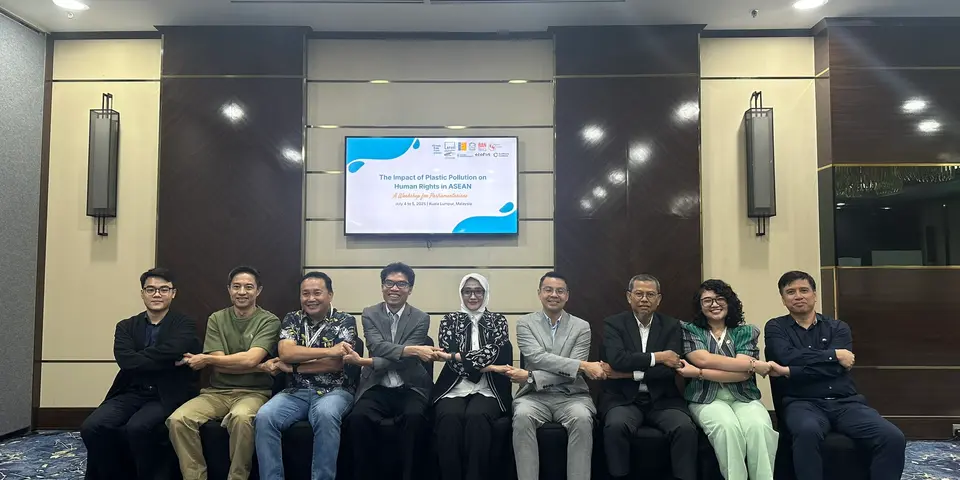
ASEAN Parliamentarians Commit to Address Human Rights Violations through Joint Action on Transboundary Plastic Pollution
July 08, 2025

08 July 2025, Kuala Lumpur—Parliamentarians and civil society representatives from Malaysia, Indonesia, Thailand, the Philippines and Vietnam gathered in a civil society-led workshop to address the growing crisis of transboundary plastic pollution and its devastating impact on human rights across Southeast Asia.
The gathering served as a platform to exchange knowledge, explore regional and national laws on plastic waste trafficking and discuss rights-based solutions within the context of the Global Plastic Treaty negotiations with the aim of fostering coordinated ASEAN action on this urgent environmental and socio-economic issue.
Southeast Asia is the region most impacted by the pressing issue of plastic pollution, production and consumption; it is not just an environmental issue but a human rights issue. Plastic pollution affects food security, right to health, right to life. It disproportionately affects women, children and communities in environmentally fragile areas. This workshop is important in placing human rights at the centre of the plastic pollution crisis – parliamentarians, whether in government or in opposition, and with your access to the media, are important and influential. Edmund Bon Tai Soon, Chair and Representative of Malaysia, ASEAN Intergovernmental Commission on Human Rights (AICHR)
Key Outcomes:
During the workshop:
- Civil society organizations (CSOs) proposed a human-rights centric joint statement to the parliamentarians, lawmakers and house representatives present;
- participants were able to discuss, deliberate and decide on key issues, wording and framing of the joint statement to better represent our unified voices, and have agreed to use it as a lobbying tool at the national, ASEAN and international levels; and,
- there were suggestions on how the joint statement could be used for future lobbying, by both parliamentarians, customs officials and CSOs, and the upcoming meetings at which our demands can be articulated.
Key Quotes from Parliamentarians & Joint Statement
This workshop has reaffirmed my commitment to advocate for a rights-based approach to environmental protection. One key takeaway is the urgent need for regional cooperation in ASEAN to strengthen plastic governance, support waste reduction at the source, and ensure that environmental policies are grounded in human rights principles. We must move beyond seeing plastic pollution as merely a waste management problem. It is a human rights issue that demands integrated solutions involving public participation, corporate accountability, and legal reforms. YB Datuk Willie Anak Mongin, MP of Puncak Borneo, Malaysia
Plastic pollution is a human rights issue – and ASEAN countries are victims of multiple facets. From being treated as a “waste bin” by developed / polluter countries as they illegally transport and import trash (which sometimes include toxic or hazardous wastes) to being the target of aggressive imperialist consumerism culture, Southeast Asian countries, its citizens, and its youth bear the brunt of this struggle. Renee Co, Kabataan Partylist Representative, the Philippines
In this workshop, the parliamentarians present agreed on a very comprehensive joint statement to solve plastic pollution that will be forwarded to higher forums, both at the ASEAN regional level, and the global level. The important message conveyed through this workshop is, “The import of plastic waste from developed countries is not just a matter of recycling or circular economy, but more fundamentally it is an interference with the sovereignty of ASEAN countries. Therefore, ASEAN countries need to increase collaboration in preparing strategies to stop the import of plastic waste in the ASEAN region. Rina Sa’adah, National Awakening Party (PKB), Indonesia
Before I came to this meeting, I was fighting against plastic waste companies and government agencies in Thailand over corruption. What I’ve learned is the importance of cooperation. As countries, we face similar problems when it comes to law enforcement. What we all know is that we can’t do this alone — we have to work together, as a coalition, as friends, and as a region. Over the course of this one-and-a-half-day workshop, I’ve developed a strong feeling that we can do it. We can fight this together. Norasate Prachyakorn, Senator, Senate of Thailand
Access the joint statement here.
The joint statement, with due inputs from parliamentarians, customs officials and civil society organizations present at the workshop, will be used for future advocacy efforts at the local, ASEAN and international levels. #
Organizing Partners
Break Free from Plastic (BFFP) & ASEAN Parliamentarians for Human Rights (APHR)
With support from BFFP members from the Asia Pacific region:
Basel Action Network (BAN), Center to Combat Corruption and Cronyism (C4 Center), Sahabat Alam Malaysia (SAM), Consumers’ Association of Penang (CAP), Pacific Environment and Resources Center Vietnam (PE-VN), Environmental Justice Foundation (EJF), Ecological Observation and Wetland Conservations (ECOTON), BAN Toxics, and EcoWaste Coalition.

For media inquiries:
Pats Oliva: Media and Communications Manager| ASEAN Parliamentarians for Human Rights (APHR) | [email protected]
Devayani Khare: Regional Communications Manager | Break Free From Plastic – Asia Pacific (BFFP-AP) | [email protected]
ASEAN Parliamentarians for Human Rights (APHR) was founded in June 2013 with the objective of promoting democracy and human rights across Southeast Asia. Our founding members include many of the region's most progressive Members of Parliament (MPs), with a proven track record of human rights advocacy work.